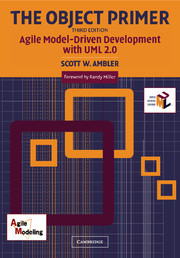Book contents
- Frontmatter
- Contents
- Acknowledgments
- Foreword
- Preface
- About the Author
- Chapter 1 Leading-Edge Software Development
- Chapter 2 Understanding the Basics–Object-Oriented Concepts
- Chapter 3 Full Lifecycle Object-Oriented Testing (FLOOT)
- Chapter 4 Agile Model–Driven Development (AMDD)
- Chapter 5 Usage Modeling
- Chapter 6 User-Interface Development
- Chapter 7 Supplementary Requirements
- Chapter 8 Conceptual Domain Modeling
- Chapter 9 Business Process Modeling
- Chapter 10 Agile Architecture
- Chapter 11 Dynamic Object Modeling
- Chapter 12 Structural Design Modeling
- Chapter 13 Object-Oriented Programming
- Chapter 14 Agile Database Development
- Chapter 15 Where to Go from Here
- Glossary
- References and Recommended Reading
- Index
Chapter 15 - Where to Go from Here
Published online by Cambridge University Press: 03 March 2010
- Frontmatter
- Contents
- Acknowledgments
- Foreword
- Preface
- About the Author
- Chapter 1 Leading-Edge Software Development
- Chapter 2 Understanding the Basics–Object-Oriented Concepts
- Chapter 3 Full Lifecycle Object-Oriented Testing (FLOOT)
- Chapter 4 Agile Model–Driven Development (AMDD)
- Chapter 5 Usage Modeling
- Chapter 6 User-Interface Development
- Chapter 7 Supplementary Requirements
- Chapter 8 Conceptual Domain Modeling
- Chapter 9 Business Process Modeling
- Chapter 10 Agile Architecture
- Chapter 11 Dynamic Object Modeling
- Chapter 12 Structural Design Modeling
- Chapter 13 Object-Oriented Programming
- Chapter 14 Agile Database Development
- Chapter 15 Where to Go from Here
- Glossary
- References and Recommended Reading
- Index
Summary
Worrying about the increasing rate of change in the IT industry is so 15 minutes ago.
Your skills, and how you apply them, are significant determinants of your success as a software professional. By reading this book, you have gained the fundamental knowledge required to begin learning object technology and agile techniques. The bottom line is that software development is hard; it takes skilled people to be successful at it. By making it to the end of this book you have learned the basics of modern software development; you have learned some useful concepts and techniques; you have started to get a handle on how they fit together; and you have applied them by working through the review questions and case studies. You are now in a good position to continue your learning process, a process that will last throughout your entire career. This chapter provides insight into where the software profession currently is, where it is going, what skills will be needed over the next few years, and how you can obtain those skills.
BECOME A GENERALIZING SPECIALIST
I believe that one of the biggest problems the IT industry faces is over specialization of skills. Many organizations have IT departments filled with Java specialists, database specialists, business analyst specialists, project management specialists, and so on. This approach is based on an organizational behavior paradigm called Taylorism, named after Frederick Taylor, who in his 1911 paper The Principles of Scientific Management set the stage for large-scale manufacturing.
- Type
- Chapter
- Information
- The Object PrimerAgile Model-Driven Development with UML 2.0, pp. 487 - 492Publisher: Cambridge University PressPrint publication year: 2004

